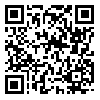1. Schmidt R, Lee T. Motor control and learning 4th ed, 207-242. Human Kinetics Publisher; 2005.
2. Magill RA. Motor learning and control. Concepts and applications. 2004;7.
3. Smith R, Lee T. Motor control and learning: a behavioural emphasis. Champaign: Human Kinetics. 1998.
4. Schimidt RA. Motor Learning and Performance from Principles to Practice. Illionis: Human Kineticks Publishers Inc. 1991.
5. Adams JA. A closed-loop theory of motor learning. Journal of motor behavior. 1971;3(2):111-50.. [
DOI:10.1080/00222895.1971.10734898]
6. Ilies R, Judge TA. Goal regulation across time: the effects of feedback and affect. Journal of applied psychology. 2005;90(3):453. [
DOI:10.1037/0021-9010.90.3.453]
7. Allen J, Howe BL. Player ability, coach feedback, and female adolescent athletes' perceived competence and satisfaction. Journal of sport and exercise psychology. 1998;20(3):280-99. [
DOI:10.1123/jsep.20.3.280]
8. Mouratidis A, Vansteenkiste M, Lens W, Sideridis G. The motivating role of positive feedback in sport and physical education: Evidence for a motivational model. Journal of sport & exercise psychology. 2008;30(2):240. [
DOI:10.1123/jsep.30.2.240]
9. Clark SE, Ste-Marie DM. The impact of self-as-a-model interventions on children's self-regulation of learning and swimming performance. Journal of Sports Sciences. 2007;25(5):577-86. [
DOI:10.1080/02640410600947090]
10. Chiviacowsky S, Wulf G. Self-controlled feedback: Does it enhance learning because performers get feedback when they need it? Research quarterly for exercise and sport. 2002;73(4):408-15. [
DOI:10.1080/02701367.2002.10609040]
11. Patterson JT, Carter M. Learner regulated knowledge of results during the acquisition of multiple timing goals. Human movement science. 2010;29(2):214-27. [
DOI:10.1016/j.humov.2009.12.003]
12. Chiviacowsky S, Wulf G. Feedback after good trials enhances learning. Research Quarterly for Exercise and Sport. 2007;78(2):40-7. [
DOI:10.1080/02701367.2007.10599402]
13. Saemi E, Wulf G, Varzaneh AG, Zarghami M. Feedback after good versus poor trials enhances motor learning in children. Revista Brasileira de Educação Física e Esporte. 2011;25(4):673-81. [
DOI:10.1590/S1807-55092011000400011]
14. Ávila LT, Chiviacowsky S, Wulf G, Lewthwaite R. Positive social-comparative feedback enhances motor learning in children. Psychology of Sport and Exercise. 2012;13(6):849-53. [
DOI:10.1016/j.psychsport.2012.07.001]
15. Chiviacowsky S, Wulf G, Lewthwaite R. Self-controlled learning: the importance of protecting perceptions of competence. Frontiers in psychology. 2012;3:458. [
DOI:10.3389/fpsyg.2012.00458]
16. Chiviacowsky S, Drews R. Effects of generic versus non-generic feedback on motor learning in children. PloS one. 2014;9(2):e88989. [
DOI:10.1371/journal.pone.0088989]
17. Ross M. Relation of implicit theories to the construction of personal histories. Psychological review. 1989;96(2):341. [
DOI:10.1037/0033-295X.96.2.341]
18. Dweck CS. Motivational processes affecting learning. American psychologist. 1986;41(10):1040. [
DOI:10.1037/0003-066X.41.10.1040]
19. Dweck CS, Leggett EL. A social-cognitive approach to motivation and personality. Psychological review. 1988;95(2):256. [
DOI:10.1037/0033-295X.95.2.256]
20. Gelman SA, Heyman GD. Carrot-eaters and creature-believers: The effects of lexicalization on children's inferences about social categories. Psychological Science. 1999;10(6):489-93. [
DOI:10.1111/1467-9280.00194]
21. Cimpian A, Arce H-MC, Markman EM, Dweck CS. Subtle linguistic cues affect children's motivation. Psychological Science. 2007;18(4):314-6. [
DOI:10.1111/j.1467-9280.2007.01896.x]
22. Drews R, Chiviacowsky S, Wulf G. Children's motor skill learning is influenced by their conceptions of ability. JMLD. 2013;1:38-44. [
DOI:10.1123/jmld.1.2.38]
23. Wulf G, Lewthwaite R. Conceptions of ability affect motor learning. Journal of Motor Behavior. 2009;41(5):461-7. [
DOI:10.3200/35-08-083]
24. Dweck CS. The development of ability conceptions. 2002. [
DOI:10.1016/B978-012750053-9/50005-X]
25. Wulf G. Self-controlled practice enhances motor learning: implications for physiotherapy. Physiotherapy. 2007;93(2):96-101. [
DOI:10.1016/j.physio.2006.08.005]
26. Badami R, VaezMousavi M, Wulf G, Namazizadeh M. Feedback after good versus poor trials affects intrinsic motivation. Research quarterly for exercise and sport. 2011;82(2):360-4. [
DOI:10.1080/02701367.2011.10599765]
27. Lewthwaite R, Wulf G. Social-comparative feedback affects motor skill learning. The Quarterly Journal of Experimental Psychology. 2010;63(4):738-49. [
DOI:10.1080/17470210903111839]
28. Chiviacowsky S, Wulf G, de Medeiros FL, Kaefer A, Tani G. Learning benefits of self-controlled knowledge of results in 10-year-old children. Research Quarterly for Exercise and Sport. 2008;79(3):405-10. [
DOI:10.1080/02701367.2008.10599505]
29. Hong Y-y, Chiu C-y, Dweck CS, Lin DM-S, Wan W. Implicit theories, attributions, and coping: A meaning system approach. Journal of Personality and Social psychology. 1999;77(3):588. [
DOI:10.1037/0022-3514.77.3.588]
30. Nicholls JG. Causal attributions and other achievement-related cognitions: Effects of task outcome, attainment value, and sex. Journal of Personality and Social Psychology. 1975;31(3):379. [
DOI:10.1037/h0076505]
31. Jourden FJ, Bandura A, Banfield JT. The impact of conceptions of ability on self-regulatory factors and motor skill acquisition. Journal of sport and exercise psychology. 1991;13(3):213-26. [
DOI:10.1123/jsep.13.3.213]









